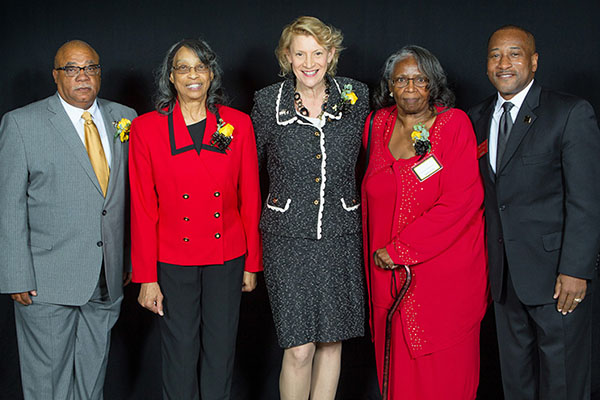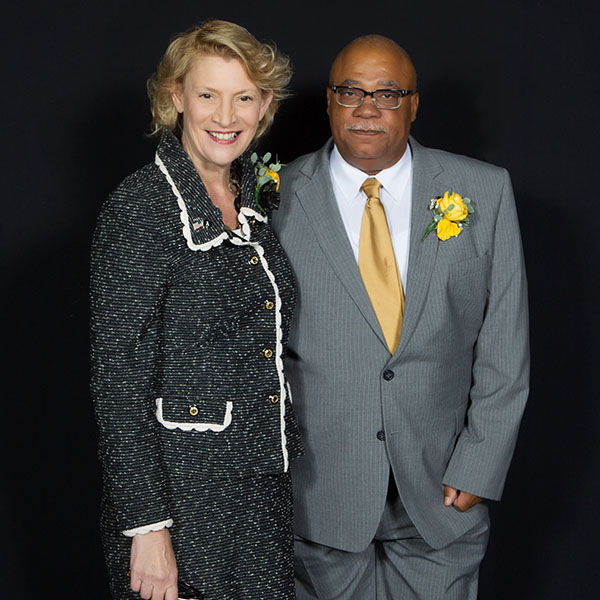Alumnus Dr. Zaphon R. Wilson ’76 ’77 of Raleigh is one of four recipients of Appalachian State University’s Faces of Courage Award. He earned both his bachelor’s and master’s degrees from the university. After earning a Ph.D. elsewhere, he returned to teach political science and became the first assistant to the provost for minority affairs, a position in which he recruited talented minority students and faculty. He also founded the Black Faculty and Staff Association.
The Faces of Courage Award recognizes those who were instrumental in Appalachian State University’s early diversity efforts.
This video tribute played at the Commemoration of Integration, held Oct. 2 in the Holmes Convocation Center as part of 2015 homecoming weekend activities. Also receiving Faces of Courage Awards at this event were Dr. Willie Fleming ’80 ’84 of Charlotte, Dr. Carolyn Anderson ’69 of Winston-Salem and Barbara Reeves Hart ’65 of Gastonia.
The award recognizes those who were instrumental in Appalachian State University’s early diversity efforts. Another former student received an honorary degree and the Black and Gold Medallion.
Wilson currently is dean of the School of Social and Behavioral Sciences and professor of political science at Saint Augustine’s University.
In the video, Wilson says of his student and faculty recruitment work at Appalachian, “It was the beginning of this conversation about diversity and how important it was for all of the students on campus. …It wasn’t just because of a black question or black issue. It was to expose all of the students to a diversity of faculty members, different backgrounds and different experiences to enrich the living and learning environment at Appalachian.”
About Appalachian State University
As a premier public institution, Appalachian State University prepares students to lead purposeful lives. App State is one of 17 campuses in the University of North Carolina System, with a national reputation for innovative teaching and opening access to a high-quality, cost-effective education. The university enrolls more than 21,000 students, has a low student-to-faculty ratio and offers more than 150 undergraduate and 80 graduate majors at its Boone and Hickory campuses and through App State Online. Learn more at https://www.appstate.edu.
Transcript
Dr. Zaphon R. Wilson: I went to Appalachian State in 1972. I majored in Political Science and graduated in four years and I loved it so much I decided to stay for a master’s degree. I went to Atlanta University and got a PHD in Political Science. I came back to Appalachian and taught there where I became an assistant to the provost assistant to Harvey Durham for Minority Affairs. He was just a phenomenal mentor and administrator and built VITA for minority faculty members. We went out recruiting minority students.
One afternoon I was sitting in my office trying to figure out how we could get more black faculty members on the campus and coming from the Atlanta University where I got my PHD from I was exposed to so many different kinds of professors from all over the world. Bringing that kind of experience to Appalachian was very important for me because it enriched my educational experience so much. So I presented the proposal to Dr. Durham after consulting with the black faculty. “Dr. Durham you’ve got the juice to do this! Let’s make it happen.” I don’t know where I got that phrase from, but it was the juice it took to push for change and he approved it. So I worked with Dr. Durham on developing a budget and expanding our scope to looking at students in graduate programs across the country and also aggressively recruiting graduate students to build a pipeline for faculty members at Appalachian. We also identified talented black students and encouraged them to go on to graduate school and consider a career in higher education. It was the beginning of this conversation about diversity and about how important it was for all the students on campus. It wasn’t just because of the black question or the black issue, it was to expose all the students to a diversity of faculty members from different backgrounds and different experiences and to enrich the living and learning environment at Appalachian.
My hopes for Appalachian in the future is that they continue in the trajectory that they are going now. In 10, 15 or 20 years from now Appalachian is going to be a completely different place. It’s going to be an inclusive environment, it’s going to be a more diverse environment, and it’s going to represent a variety of ethnic groups and racial groups. Appalachian is poised for even more greatness.
What do you think?
Share your feedback on this story.






![How NCInnovation Is Rethinking Economic Development in North Carolina [faculty featured]](/_images/_posts/2026/02/rethinking-economic-development-600x400.jpg)







